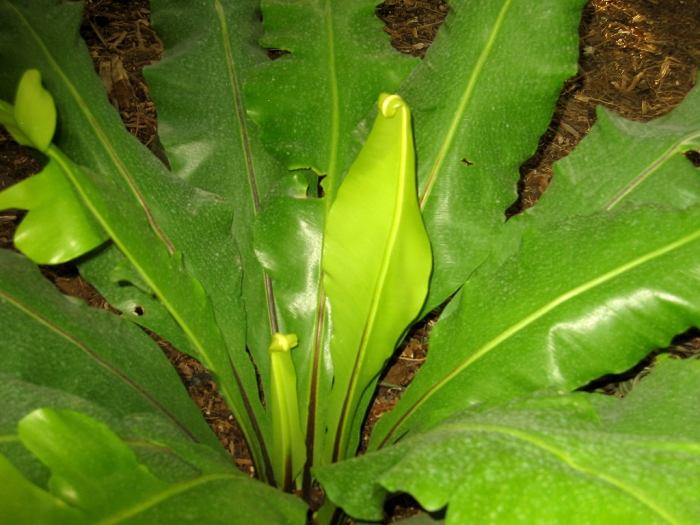Bird’s-Nest Fern
(Asplenium nidus)
Bird’s-Nest Fern (Asplenium nidus)
/
/

Cookie
CC BY-SA 3.0
Image By:
Cookie
Recorded By:
Copyright:
CC BY-SA 3.0
Copyright Notice:
Photo by: Cookie | License Type: CC BY-SA 3.0 | License URL: http://creativecommons.org/licenses/by-sa/3.0/ | Uploader: Cookie | Publisher: Wikimedia Commons | Title: Asplenium-detail.jpg | Notes: |























































Estimated Native Range
Summary
Asplenium nidus, commonly known as Bird’s-Nest Fern, is an evergreen perennial herb native to tropical rainforests and humid, shaded environments in Southeast Asia, Oceania, and Queensland, Australia. It is characterized by its large, simple fronds that resemble banana leaves, growing to 50–150 centimeters (20–59 inches) long and 10–20 centimeters (3.9–7.9 inches) broad. Exceptionally large individuals can reach up to 2 meters (6.6 feet) in length and 61 centimeters (2 feet) in width. The fronds are light green, often crinkled, with a distinctive black midrib and circinate vernation. Spores are produced in sori located on the underside of the fronds, arranged in long rows extending from the midrib. As the fronds age and brown, they roll back, contributing to the plant’s common name by forming a nest-like structure.
Bird’s-Nest Fern is valued for its lush, tropical appearance and ease of care as a houseplant. It is often used in interior landscaping and as a decorative feature in shaded garden areas. The plant’s ability to thrive in low light conditions makes it suitable for north-facing walls and shaded corners. It has earned the Royal Horticultural Society’s Award of Garden Merit, indicating its reliability and performance in gardens. In cultivation, it prefers part shade to full shade, consistent moisture, and well-draining soil. While generally disease-free, it can suffer from scale insects and mealybugs. Overwatering can lead to root rot, so it is important to ensure proper drainage.CC BY-SA 4.0
Bird’s-Nest Fern is valued for its lush, tropical appearance and ease of care as a houseplant. It is often used in interior landscaping and as a decorative feature in shaded garden areas. The plant’s ability to thrive in low light conditions makes it suitable for north-facing walls and shaded corners. It has earned the Royal Horticultural Society’s Award of Garden Merit, indicating its reliability and performance in gardens. In cultivation, it prefers part shade to full shade, consistent moisture, and well-draining soil. While generally disease-free, it can suffer from scale insects and mealybugs. Overwatering can lead to root rot, so it is important to ensure proper drainage.CC BY-SA 4.0
Plant Description
- Plant Type: Fern
- Height: 3-5 feet
- Width: 2-3 feet
- Growth Rate: Slow
- Flower Color: N/A
- Flowering Season: Non-Flowering
- Leaf Retention: Evergreen
Growth Requirements
- Sun: Part Shade, Full Shade
- Water: Medium
- Drainage: Medium
Common Uses
Bank Stabilization, Border Plant, Deer Resistant, Low Maintenance, Potted Plant, Rabbit Resistant, Rock Garden, Street Planting
Natural Habitat
Native to tropical rainforests and humid, shaded environments in Southeast Asia, Oceania, and Queensland, Australia
Other Names
Common Names: Bird’s Nest Fern, Nest Fern, Fågelbobräken, 파초일엽
Scientific Names: , Asplenium nidus, Neottopteris nidus, Asplenium nidus var. nidus, Asplenium ellipticum, Asplenium ficifolium, Neottopteris elliptica, Aconiopteris gorgonea, Acrostichum gorgoneum, Asplenium nidus var. multilobum
GBIF Accepted Name: Asplenium nidus L.